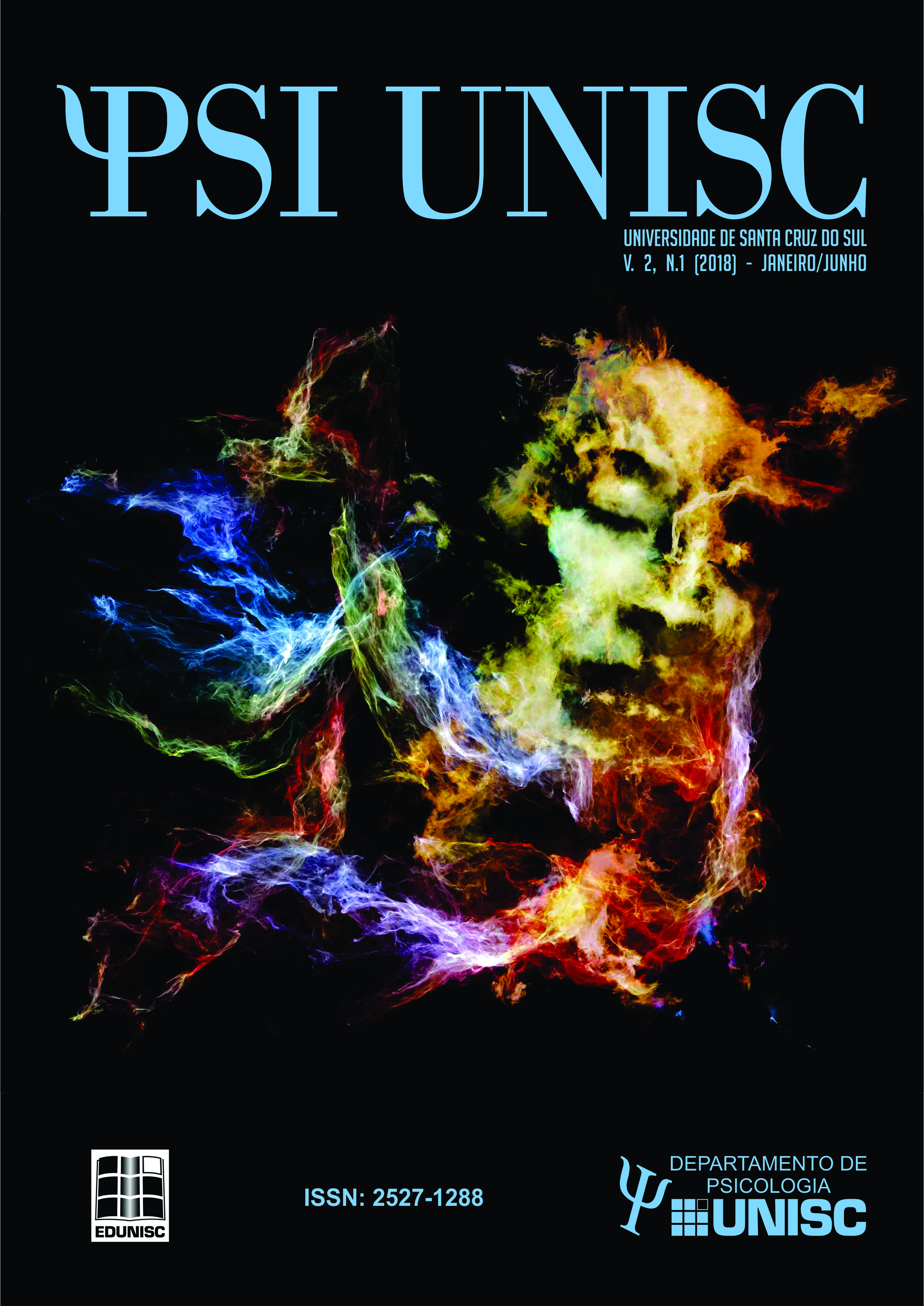Everyday life and Identity in the Clinic of Activity and Ergology
DOI:
https://doi.org/10.17058/psiunisc.v2i2.9923Keywords:
Work. Identity Processes. Activity Analysis.Abstract
This article addresses the presence the concepts of everyday life and identity in the approaches usually designated Clinic of Activity and Ergology and propose an analysis of the methodological relevance of this concepts to research of daily work situations. It is argued that although the concepts in question are not key concepts in the theories under analysis, they present fundamental aspects of these approaches. The Work Clinics, in general, and the approaches here considered in particular, are based on a distinction between the prescribed and actual dimensions of the work, including the activity as the possibilities of action of the subject who works opposite the prescribed amount of work and the various elements that make up the work processes and the organizational context. By highlighting the importance of everyday notions and identity, it is intended to contribute both to the theoretical development of clinical work studies and to their intervention methodologies.Downloads
References
Athayde, Milton &Brito, Jussara (2011). Ergologia e Clínica do Trabalho. In: Bendassolli, P. E. &Soboll, L. A. Clínicas do Trabalho. São Paulo: Atlas.
Bendassolli, Pedro. E. &Soboll, Lis Andrea. (2011). Introdução às clínicas do trabalho. Aportes teóricos, pressupostos e aplicações. In: Bendassolli, P. E. &Soboll, L. Clínicas do Trabalho. São Paulo: Atlas.
Brewer, Marilynn B. & Gardner, Wendi (1996).Who is the “We”? Levels of Collective Identity and Self Representations. Journal of Personality and Social Psychology. v. 71, n. 1, p. 83-93.
Brewer, Marilynn B. (2001).The Many Faces of Social Identity: implications for political psychology. Political Psychology. v. 22, n. 1, p. 115-125.
Canguilhem, Georges (2002). O Normal e o Patológico. Rio de Janeiro: Forense Editora.
Certeau, Michel de (2013). A invenção do cotidiano. 1. Artes do fazer. 20 Ed. Petrópolis: Vozes. Ed. original de 1990.
Clot, Yves. (2006). A Função Psicológica do Trabalho. Petrópolis, Rj: Vozes.
Clot, Yves. (2010). Trabalho e Poder de Agir. Belo Horizonte, Belo Horizonte: Fabrefactum.
Dubar, Claude. (2005). A Socialização. Construção das Identidades Sociais e Profissionais. São Paulo: Martins Fontes.
Erikson, Erik. (1976). Identidade: juventude e crise. Rio de Janeiro: Zahar Editores. Edição original de 1968.
Faïta, Daniel. (2002). Análise das práticas linguageiras e situações de trabalho: uma renovação metodológica imposta pelo objeto. In: Maria Cecilia Souza-e-Silva & Daniel Fäita. Linguagem e Trabalho. Construção de objetos de análise no Brasil e na França. São Paulo: Cortez Ed.
Faïta, Daniel; Vieira, Marcus. (2003). Reflexões metodológicas sobre a autoconfrontação cruzada. Delta. São Paulo, v. 19, n. 1.
Freud, Sigmund. (1976). Psicologia de Grupo e Análise do Ego. Edição Standart das Obras Psicológicas Completas de Sigmund Freud. V. XVIII. Rio de Janeiro: Imago Editora. Original publicado em 1921.
Guérin, François; Laville, Antoine; Daniellou, François; Duraffourg, J.; Kerguelen, A. (2001). Compreender o trabalho para transformá-lo. A prática da ergonomia. São Paulo: Editora Edgard Blücher.
Heller, Agnes. (1988). O cotidiano e a história. São Paulo: Paz e Terra. Edição original de 1970.
Heller, Agnes. (1994) Sociologia de la Vida Cotidiana. 4. Ed. Barcelona: Ediciones Península.
Hitlin, Steven. (2003).Values As The Core of Personal Identity: Drawing Links Between Two Theories of Self. Social Psychology Quarterly, v. 66, n. 2, p. 118-137.
Jenkins, Richard. (1996). Social Identity. New York, Routledge.
Leary, Mark R.; Tangney, June Price (2003). The Self as an Organizing Construct in the Behavioral and Social Sciences. In: Leary, M. R.; Tangney, J. P. (eds.). Handbook of Self and Identity. New York: The Guilford Press.
Lhuilier, Dominique. (2011). Filiações Teóricas das Clínicas do Trabalho. In: Bendassolli, P. E. &Soboll, L. A. Clínicas do Trabalho. São Paulo: Atlas.
Meyer, John P. & ALLEN, Natalie J. (2007). Commitment in the Workplace. Theory, research and application. Thousand Oaks, CA: Sage.
Melucci, Alberto. (1996). Challenging Codes – Collective Action in the Information Age. Cambridge: University Press.
Mucchielli, Alex. (1994). L’Identité. 3. Ed. Paris: Press Universitaire de France.
Naujorks, Carlos J. &Silva, Marcelo K. (2016). Correspondência Identitária e Engajamento. Civitas. Porto Alegre, v. 16, n. 1, jan-mar, p. 136-156.
Oddone, Ivar (et al.) (1986). Ambiente de Trabalho. A luta dos trabalhadores pela saúde. São Paulo: Hucitec.
Onorato, Rina S.; Turner, John C. (2001). The “I”, the “Me” and the “us”: The psychological group and self-concept maintenance and change. In: Sedikides, C.; Brewer, M. B. (orgs) Individual Self, Relational Self, and Collective Self. Philadelphia: Psychology Press.
Owens Timothy J.; Robinson Dawn T.; Smith-Lovin. Lynn (2010). Three Faces of Identity. Annual Review of Sociology. v. 36, p. 477–99.
Sato, Leny. &Oliveira, Fábio de (2008). Compreender a gestão a partir do cotidiano de trabalho. Aletheia, v. 27, p. 188-197.
Sato, Leny. & SOUZA, M. P. R. de (2001). Contribuindo para desvelar a complexidade do cotidiano através da pesquisa etnográfica em Psicologia. Psicologia USP, 12(2).
Schwartz, Yves &Durrive, Louis (2007). Trabalho e Ergologia: conversas sobre a atividade humana. Niterói: Universidade Federal Fluminense.
Schwartz, Yves (2000). Trabalho e usos de si. Pro-posições, v. 1, n. 5. (32), Julho.
Silva, Marcelo Kunrath. (2010). De volta aos movimentos sociais? Reflexões a partir da literatura brasileira recente. Ciências Sociais Unisinos, v. 46, n. 1, p.2-9.
Spink, Mary. J. P. (2007). Pesquisando no cotidiano: recuperando memórias de pesquisa em Psicologia Social. Psicologia & Sociedade, 19(1), p. 07-14.
Spink, Peter. K. (2008). O pesquisador conversador no cotidiano. Psicologia & Sociedade, 20, p. 70-77.
Stets, Jan E.; Burke, Peter J. (2003) A Sociological Approach to Self and Identity. In: Leary, Mark R.; Tangney, June P. Handbook of Self and Identity. New York: The Guilford Press.
Stryker, Sheldon (1981). Social Psychology.Trends, assessment and prognosis. American Behavioral Scientist, v. 24, n. 3, January/February, p. 386-406.
Stryker, Sheldon. (2000). Identity competition: key to differential social movement participation. In: Sheldon Stryker; Timothy J. Owens; Robert White. Self, Identity, and Social Movements. Minnesota: University of Minnesota Press.
Stryker, Sheldon. (2007). Identity theory and personality theory: mutual relevance. Journal of personality, v. 75, n. 6, December.
Tajfel, Henri. (1982). Grupos Humanos e Categorias Sociais. Estudos em psicologia social, vols. 1 e 2. Lisboa: Livros Horizonte.
Tedesco, João C. (1999). Paradigmas do cotidiano: introdução à constituição de um campo de análise social. Santa Cruz do Sul: EDUNISC.
Telles, Ana L.&Alvarez, Denise. Interfaces ergonomia-ergologia: uma discussão sobre trabalho prescrito e normas antecedentes. In: Figueiredo, M. Athaíde, M. Brito, J.Alvarez, D. (Org.) Labirintos do trabalho: interrogações e olhares sobre o trabalho vivo. Rio de Janeiro: DP&A, 2004, p. 63-90.
Vasconcelos, Ricardo &Lacomblez, Marianne. (2005). Redescubramo-nos na sua experiência: O desafio que nos lança Ivar Oddone. Laboreal. v. 1, n. 1, p. 38-51. Recuperado em http://laboreal.up.pt/revista/artigo.php?id=37t45nSU5471122647:5:23351.
Viegas, Moacir. (2013). Histórico e conceitos da ergologia. Entrevista com Yves Schwartz. Reflexão e Ação, v. 21, n.1.
Downloads
Published
How to Cite
Issue
Section
License
The submission of originals to this journal implies the transfer, by the authors, of the printed and digital publication rights. The copyrights for the published articles are those of the author, with periodical rights on the first publication. Authors may only use the same results in other publications clearly indicating this journal as the medium of the original publication. Because we are an open access journal, we allow free use of articles in educational and scientific applications provided the source is cited under the Creative Commons CC-BY license.




